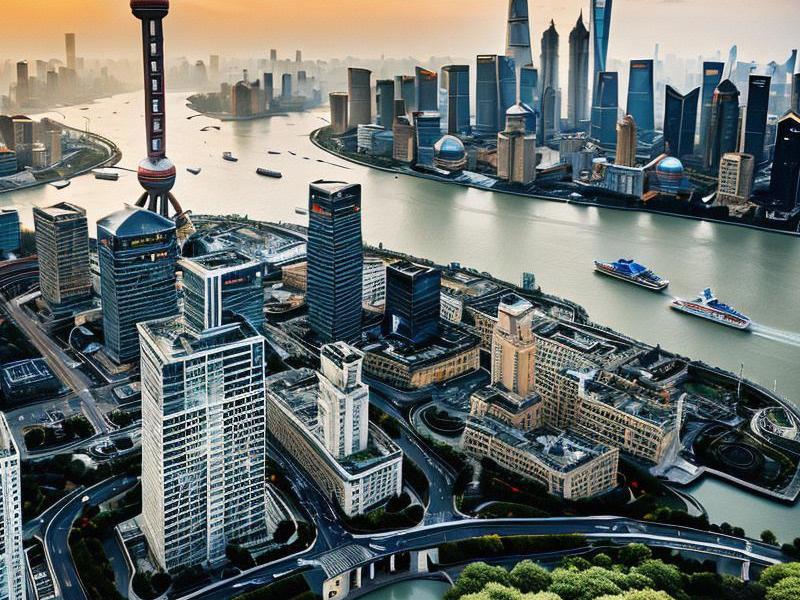
Shanghai, the bustling metropolis on the banks of the Huangpu River, has long been a symbol of China's rapid economic and social transformation. Over the past few decades, Shanghai has not only emerged as a global financial center but also as a hub for innovation, culture, and international exchange. This article traces Shanghai's journey from a traditional city to a modern global powerhouse, highlighting the key milestones and the challenges it has faced along the way.
The Historical Context
Shanghai's history dates back thousands of years, but it was during the 19th century that the city began to take on its modern form. The opening of the Treaty Ports in 1842 following the First Opium War marked the beginning of Shanghai's transformation into a major international port city. The influx of foreign trade and investment led to the establishment of the International Settlement and the French Concession, which brought about significant architectural and cultural changes.
During this period, Shanghai became known as the "Paris of the East," renowned for its cosmopolitan lifestyle, vibrant nightlife, and diverse cultural influences. However, this era of prosperity was also marked by social inequality and political instability, which would shape the city's future development.
Urban Development and Modernization
The latter half of the 20th century saw unprecedented urban development in Shanghai. The economic reforms initiated by Deng Xiaoping in 1978 set the stage for Shanghai's transformation. The city government launched a series of ambitious urban planning projects aimed at modernizing infrastructure, improving living standards, and attracting foreign investment.
上海私人品茶 One of the most significant projects was the construction of the Pudong New Area in the 1990s. Once a rural area on the eastern side of the Huangpu River, Pudong has since become a symbol of Shanghai's modernity. The development of Lujiazui, the financial district, saw the rise of iconic skyscrapers such as the Oriental Pearl Tower, the Jin Mao Tower, and the Shanghai Tower, which is currently the tallest building in China and the second tallest in the world.
The extension of the Shanghai Metro system has also played a crucial role in urban development. With over 800 kilometers of track and more than 400 stations, the metro network has connected various parts of the city, facilitating the movement of millions of residents and visitors daily.
Innovation and Technology
Shanghai's commitment to innovation and technology has positioned it as a leading global hub for research and development. The city has established several high-tech zones, such as the Zhangjiang Hi-Tech Park and the Shanghai International Automobile City, which have attracted numerous multinational corporations and startups.
The Chinese government's "Made in China 2025" initiative has further accelerated Shanghai's transformation into an innovation-driven economy. The city has invested heavily in artificial intelligence, biotechnology, and advanced manufacturing, fostering a vibrant ecosystem for startups and entrepreneurs.
Shanghai's universities and research institutions have also contributed to the city's innovation landscape. Fudan University, Tongji University, and the Shanghai Jiao Tong University are among the top institutions in China, producing cutting-edge research and nurturing a highly skilled workforce.
上海品茶网 Cultural Heritage and Globalization
While embracing modernity, Shanghai has also made significant efforts to preserve its rich cultural heritage. The city's historic districts, such as the Bund and the French Concession, showcase a blend of colonial architecture and traditional Chinese elements. Efforts have been made to restore and protect these landmarks, ensuring that they remain vibrant centers of culture and history.
Shanghai's museums, galleries, and theaters reflect the city's commitment to cultural preservation and international exchange. The Shanghai Museum, with its extensive collection of Chinese art, and the Power Station of Art, a former power plant turned contemporary art museum, are just a few examples of the city's cultural institutions.
Shanghai has also become a global stage for cultural events and festivals. The Shanghai International Film Festival, the Shanghai Fashion Week, and the Shanghai World Expo are among the many events that attract millions of visitors from around the world. These events not only showcase Shanghai's cultural vibrancy but also enhance its global profile.
Challenges and Future Prospects
爱上海 Despite its many achievements, Shanghai faces several challenges as it continues its journey towards becoming a global innovation hub. One of the main challenges is managing the rapid urbanization and population growth while ensuring sustainable development. The city has implemented various measures to address environmental issues, such as promoting green buildings, improving waste management systems, and increasing the use of renewable energy.
Another challenge is maintaining a balance between economic growth and social equity. Shanghai has taken steps to improve public services, such as healthcare and education, to ensure that the benefits of economic development are shared by all residents. The city government has also launched initiatives to support small and medium-sized enterprises (SMEs) and promote entrepreneurship.
Looking ahead, Shanghai aims to further enhance its global competitiveness by strengthening its position as a financial center, fostering innovation, and deepening international cooperation. The city's strategic location and well-developed infrastructure make it an ideal hub for global trade and investment.
Conclusion
Shanghai's journey from a traditional metropolis to a global innovation hub is a testament to the city's resilience, adaptability, and vision. Through urban development, innovation, and cultural preservation, Shanghai has successfully balanced modernization with its rich heritage. As the city continues to evolve, it remains a beacon of progress and a symbol of China's aspirations on the global stage.
In conclusion, Shanghai's transformation is not just a story of economic growth but also a narrative of cultural exchange and global integration. The city's ability to embrace change while honoring its past positions it as a model for other cities around the world. As Shanghai looks to the future, its journey serves as an inspiration for cities seeking to achieve sustainable and inclusive development.
